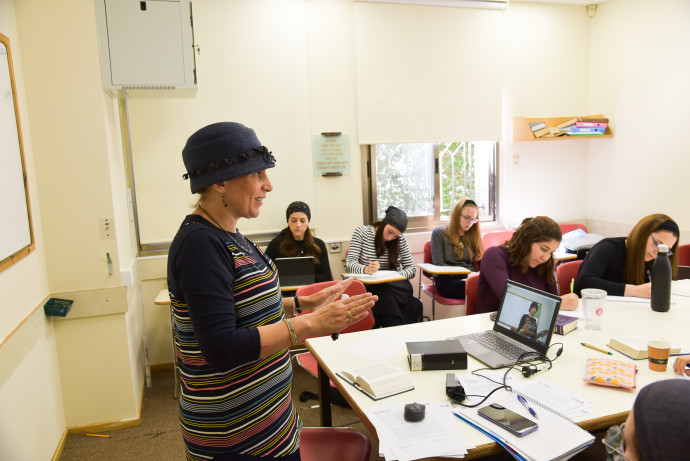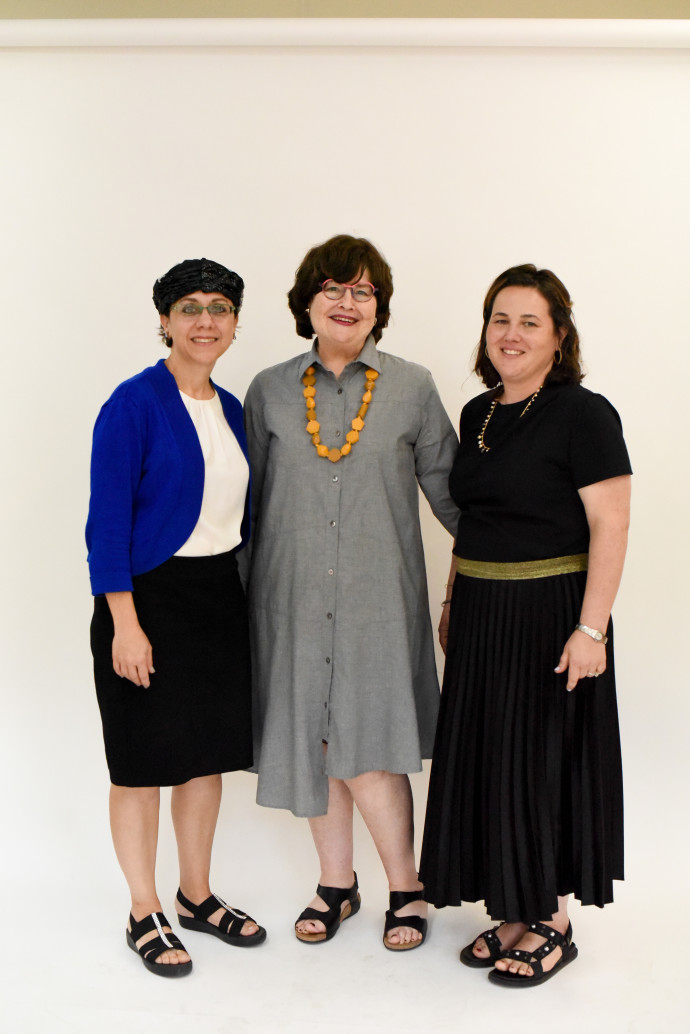‘We want to make the Tanach alive and exciting and relevant,” says Dr. Yael Ziegler, rosh batei midrash and academic director of Matan – The Sadie Rennert Women’s Institute for Torah Studies, “and we want to teach it with a passion that shows why it’s the world’s best-selling book, why it conveys to us how to live the sort of life that God wants us to live.”
Teaching, studying and understanding the Bible has been one of the hallmarks of Matan since it was founded in 1988 by Rabbanit Malke Bina, president of Matan.
Matan has become one of Israel’s leading institutions for women’s Torah study, with cutting-edge programs and pioneering institutes in Talmud and Halacha as well as Tanach. Over 10,000 students attend classes weekly in Matan’s 11 branches throughout the country and worldwide.
Acclaimed scholars make up Matan’s faculty, including Rabbanit Oshra Koren, director of Matan HaSharon; Rabbanit Rachelle Sprecher Fraenkel, director of Hilkhata – Matan’s Advanced Institute for Halakhic Studies; Tanya White; Rabbanit Nechama Goldman Barash; Yael Leibowitz; and Dr. Avivah Gottlieb Zornberg.
One of Matan’s most ambitious programs does not target Tanach students but instead is directed at Tanach teachers. The Bellows Eshkolot Educators Institute for Tanach and Jewish Studies, now in its sixth year, trains female Jewish educators to become master teachers and leaders in Jewish schools in the Diaspora.
The Institute is ideal both for women starting their careers in Jewish education and for experienced teachers who want to enrich their knowledge and sharpen their pedagogical skills.
Rabbanit Shani Taragin has taught at Matan for 22 years and has served as the educational director of the Eshkolot program since its inception.

Several years ago, she took note of the fact that many of her Tanach students did not have the same level of Hebrew proficiency as students in earlier years and were lacking in basic skills.
“I had an idea to create a program both for pedagogical study and to expand the scope and simultaneously the skill of Tanach teachers to benefit primarily North American students,” she recalls.
The program was initiated with the generous support of Joan and Shael Bellows from Chicago, a prominent national foundation based in the US, and private donors. They collaborated with Matan to create a Tanach teachers training institute primarily to benefit North American teachers as well as those who teach in educational programs here in Israel.
The first cohort was coordinated by Dr. Bryna Levy, Taragin and Dr. Dodi Tobin, who served as dean, and students met four days a week at the school’s Jerusalem campus. The program was designed to help teachers develop their skills in biblical exegesis, textual study and Hebrew language, and academic and literary interpretation of Tanach.
Margot Botwinick grew up in Teaneck, New Jersey, and taught Talmud and Tanach at the Rae Kushner Yeshiva High
School before moving to Israel. She was a member of the first class of the Eshkolot program and explains, “It was incredible. During Eshkolot, I was teaching at Midreshet Torah V’Avodah, while learning about education amongst a cohort of incredible, thoughtful women. While teaching in Midrasha, I was able to get that mentorship at the same time. It was very powerful.”
Botwinick says that Matan’s approach is exceptional. “What Matan has to offer in terms of their approach to Torah learning is very unique – to have the range of teachers teaching on such a high level with a Zionistic approach to Torah that’s both rooted academically with real methodology coupled with a true love of Torah and traditional texts.”
Today, Botwinick and her husband, Rabbi Josh Botwinick, head the Jewish Learning Initiative at Reichman University in Herzliya. Margot teaches classes during the week and says that she has adapted many of her Tanach classes from the teachings of Ziegler and Taragin.
The methodology that is taught at Eshkolot, she says, “relies a lot on character analysis and encourages us to think creatively about the way that we personally view the text, while also saying, if we can couple our own creativity with the traditional commentaries, how much we can take that to the next level.
“Every educator at Eshkolot has that unique approach to encourage our own creativity while also being deeply rooted in the text.”
Ayelet Jacobson, 25, a student in this year’s cohort, grew up near Philadelphia, studied at Migdal Oz and Barnard College, and taught at SAR Academy in Riverdale for two years. She made aliyah this year and says that she decided to attend the Eshkolot program “to further my Tanach and Judaic studies knowledge – not just learning the material but learning how to teach. At Matan, I’ve been exposed to female powerhouses that exist in the world of Tanach and teaching Torah. Not only have I been exposed to them, but I have forged connections with them that I hope to continue.”
She says that the program infuses pedagogy into everything that she is learning. “We are learning how to teach,” she says.
Ziegler, who, in addition to her administrative position at Matan is a noted Tanach scholar and author, teaches in the Eshkolot program and explains that the program placed a great emphasis on pedagogy from the outset. “The purpose of Eshkolot was to offer more pedagogical training to teachers, mostly at an early stage in their career, and to give them training so that they could go back to the North American classrooms and teach Tanach. There was a real emphasis on pedagogy. The idea was to help these teachers to become better teachers and use the knowledge and teacher training that we can offer them to advance in their teacher training.
“By having the experience of learning Tanach in Israel and going on Tanach tiyulim, they can take some of that love for Israel and love for Tanach learning in Israel and bring it back into the American classrooms.”
The Eshkolot program has two tracks. The full-time program takes place at Matan in Jerusalem, and, Ziegler explains, it is designed for younger teachers who are in the early years of their careers.
The program meets four days a week and includes top Tanach educators from Israel and around the world, including Simi Peters, Rabbi Aviah Hacohen, Rabbi David Fohrman, Dr. Lisa Fredman, Dr. Ariella Agatstein and Dr. Yoni Grossman. Melissa Rayman is Eshkolot’s director of programming.
Taragin explains that while some Eshkolot graduates remain in Israel, the majority will return and teach in schools and camps in North America.
The Eshkolot program in Jerusalem has produced close to 80 graduates thus far, who have absorbed the teachings and pedagogical methods taught at Matan and are now teaching in some of the top Jewish schools throughout the US, England and Australia.
She notes that students in the Eshkolot program do far more than sit each day, listening to lectures. “We tried to create a very interdisciplinary program where they’re not only in the classroom, learning the text, but we also provide for public speaking, for textual writing, taking them on Tanach tiyulim because you can’t really understand the stories of Deborah and Gideon and the return of the Ark unless you’re actually there on site. Once you’re there, there’s really a twofold benefit. Not only do you understand the story more, but you’re able to set the scene for your students.”
Taragin adds that the program provides a variety of different pedagogic viewpoints and methodologies, ranging from midrashic approaches that interpret and elaborate the text to a more literal approach that emphasizes the plain meaning (peshat) of the words. Additionally, teachers are briefed on the latest educational technologies, websites, and tools for improving Tanach study and making it more relevant.
Students in the Eshkolot program can receive academic credit toward master’s degree studies in education at the Hebrew University of Jerusalem, and will soon be able to receive credit toward a master’s degree in Tanach at Bar-Ilan University.
Chaya Bina-Katz, Matan’s CEO, has worked hard to ensure that Matan’s Beit Midrash Programs, including Eshkolot, classes and special events, not only continued seamlessly throughout the pandemic but actually grew in numbers.
She comments that “Matan is committed to excellence. We strive to lead the way in women’s advanced Torah education with outstanding programs in Talmud, Halacha, Tanach and more.
“It’s important for us to offer a program like Eshkolot, which is intended to elevate the quality of Jewish education abroad.”

In 2020, Matan launched a second Eshkolot track, called the Professional Development Fellowship, which is offered on Zoom, and was designed for experienced North American educators unable to travel to Israel to study who want to deepen their Tanach knowledge and broaden pedagogical methods.
Classes are offered once a week on Sundays, and the fellowship includes a travel stipend for a 10-day advanced Tanach training seminar in Matan Jerusalem in 2022/2023 (COVID permitting). Rivi Frankel serves as the director of the Professional Development Fellowship.
Olivia Friedman teaches Tanach and Oral Law, and is the instructional technology coordinator at the Ida Crown Jewish Academy in Skokie, Illinois. She participated in the professional development course this past year and explains why the program caught her eye.
“There were several different factors. One was the prestige of the educators with whom we were going to study. We were going to learn with Rabbanit Taragin and Dr. Yael Ziegler and have guest speakers like Rabbi Alex Israel and Simi Peters. It also was very exciting to be able to meet and interact with women across North America and learn from them.
“There were so many different components to the program. There were the actual lectures and topics that were taught, where Dr. Ziegler was teaching the Book of Judges and Rabbanit Taragin was teaching Leviticus and Numbers. But in addition to that, Rivi Frankel was leading virtual tours that were connected to particular books of the Tanach. So, there was a practical takeaway where I could use it to teach in my class. To this day, I have been doing that.”
Friedman reports that the online course included students from Texas, New York, Los Angeles and Israel and adds that the fact that she had access to outstanding educators who were able to provide her with practical tips and assistance made the course of study worthwhile.
Friedman says that she occasionally encounters apathy among Tanach students who feel that the subject matter is old and no longer relevant.
“I think that the meeting of the minds that was provided via Eshkolot spoke to a lot of these issues,” she says, “because we were learning pedagogical techniques that will help us to engage the students.”
Rabbanit Malke Bina summarizes the goals and accomplishments of the Eshkolot program: “We wanted our future teachers to be the best Jewish educators that they could be and founded Eshkolot to give them the depth of Tanach knowledge and pedagogic skills to achieve that goal.
“We are deeply proud of our graduates who are teaching in top day schools in Cleveland, New Jersey, Chicago, LA, New York, Houston, as well as in the UK and more. They are also teaching in summer camps, gap year programs, midrashot and universities in Israel and in the US, making a meaningful difference.”
This Sunday, February 6, the Eshkolot program will offer a small taste of its program with two mini-classes on Zoom at 10 a.m. EST; 9 a.m. CST; 5 p.m. IL, given by Dr. Yael Ziegler and Rabbanit Shani Taragin.
This article was written in cooperation with Matan – The Sadie Rennert Women’s Institute for Torah Studies.
